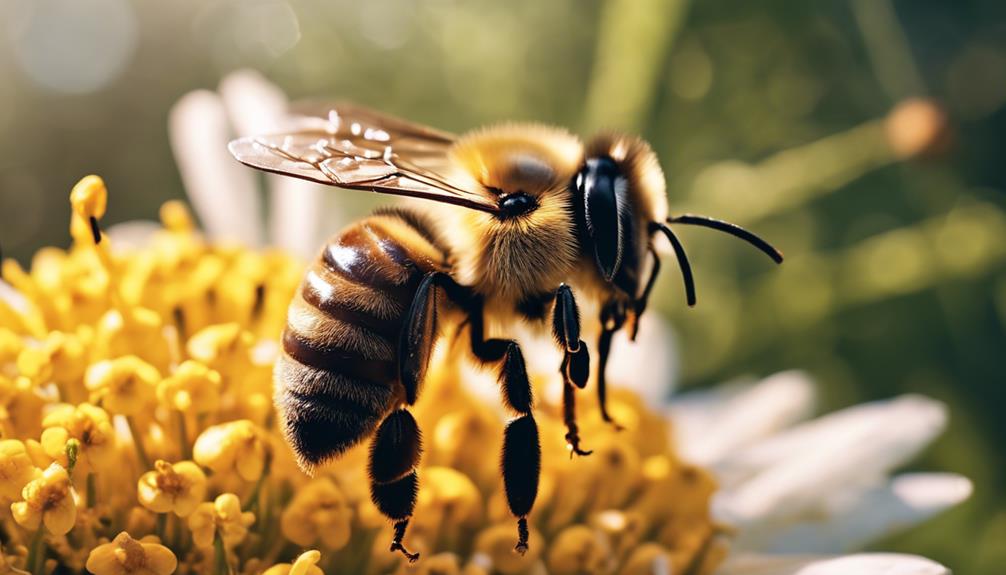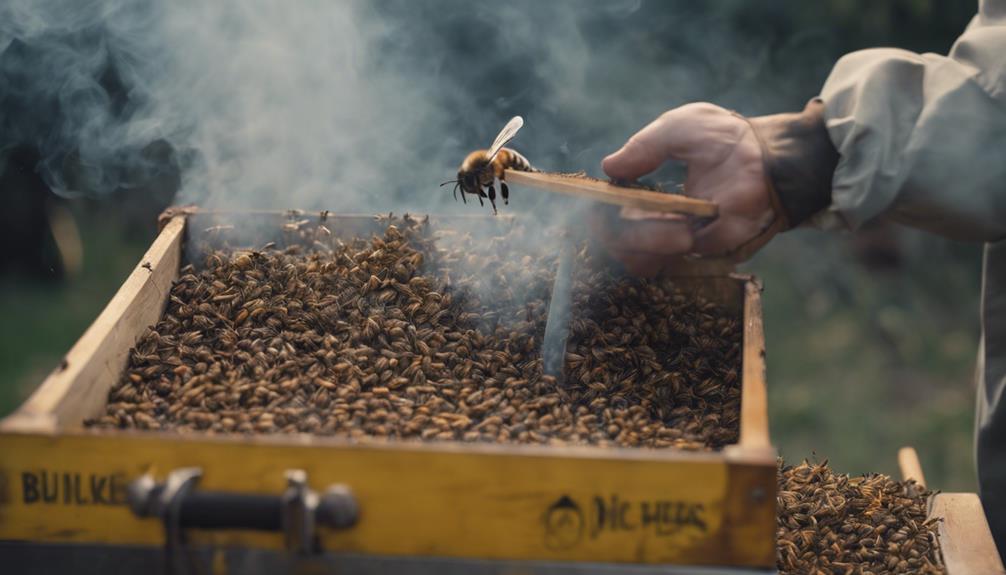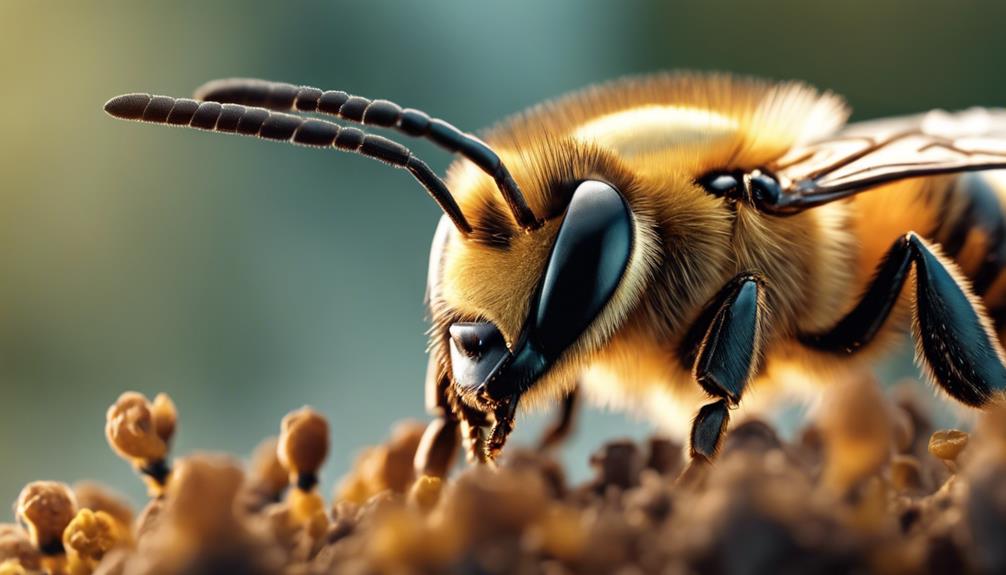In the realm of deterring bees, scents like neem, mint, citronella, lavender, eucalyptus, and lemongrass are our trusty allies. These fragrances mess with bees’ senses and ability to navigate, making them choose to buzz off. So, next time you’re looking to create a bee-free environment, incorporating these natural repellents can help keep those busy bees away!
Main Points
- Neem: Pungent fragrance disrupts bees’ sensory cues.
- Mint: Strong scent from mint disrupts bees’ navigation.
- Citronella: Powerful aroma acts as a natural barrier against bees.
- Lavender: Floral scent confuses bees’ navigation systems effectively.
- Eucalyptus: Potent aroma serves as a ‘no bees allowed’ sign.
Neem
Neem’s pungent fragrance repels bees effectively in gardens and outdoor spaces. The strong scent of neem acts as a natural deterrent for bees, making it an excellent choice for those looking to keep bees away from specific areas.
By using neem oil as a bee-repelling spray on plants, you can create a barrier that bees find unpleasant, discouraging them from nesting in your garden. The bitter and pungent smell of neem disrupts bees’ sensory cues, causing them to steer clear of neem-infused zones.
Incorporating neem trees or neem-based products into your outdoor space can help maintain a bee-free environment without harming these essential pollinators. So, if you’re looking to repel bees naturally, neem might just be the perfect solution for your garden.
Mint
After exploring how neem effectively repels bees in gardens, let’s now shift our focus to mint, another natural repellent bees hate due to its strong scent. Planting mint in your garden can help keep these buzzing creatures at bay.
The pungent aroma of mint disrupts bees’ ability to navigate, making it an effective deterrent. Whether using mint leaves or essential oils strategically placed around your garden, you can create a bee-free zone without harming them.
This eco-friendly approach not only serves as a repellent but also adds a fresh fragrance to your outdoor space. So, if you’re looking for a safe and natural way to keep bees away, mint might just be the solution you’ve been searching for.
Citronella
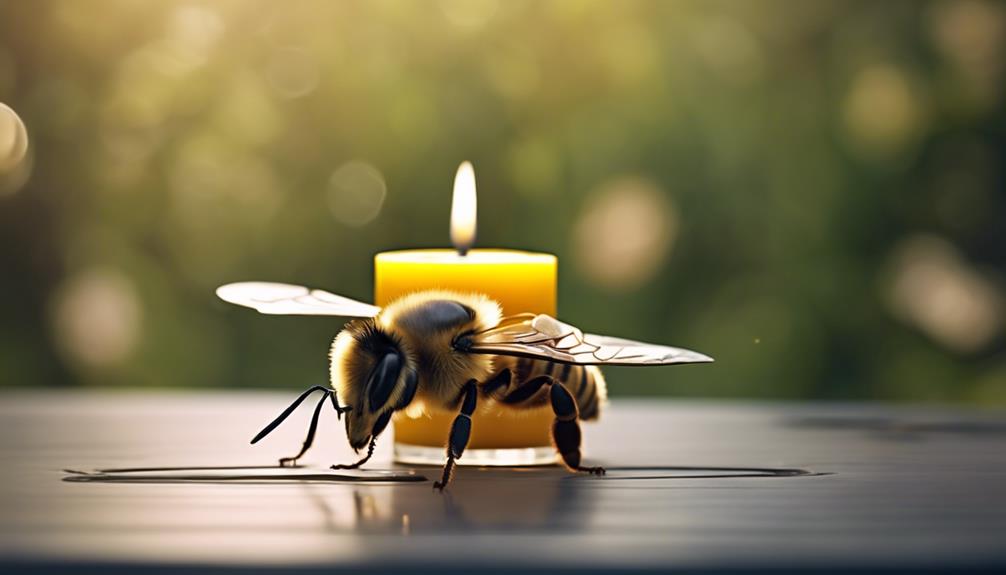
Citronella is a powerful weapon against bees; the intense aroma it emits acts as a natural barrier, keeping these buzzing insects at bay.
When citronella is in play, bees steer clear, avoiding areas where its distinct scent lingers.
Citronella Repels Bees
Using citronella as a natural repellent against bees proves effective due to its strong and overpowering aroma that disrupts their ability to communicate and locate food sources. Bees hate the scent of citronella, making it a great option for keeping them away from your outdoor spaces. Citronella oil, found in candles and sprays, is a popular choice to deter bees from nesting or foraging in specific areas.
The citrus-like fragrance of citronella not only repels bees but also helps create a pleasant environment for you to enjoy without the buzzing visitors. Whether you plant citronella plants or use citronella-based products, you can take a proactive approach to make sure bees steer clear of your yard or patio.
Strong Scent Deters Bees
The potent aroma of citronella effectively deters bees from invading outdoor spaces. Bees just can’t stand the strong scent this plant emits! It’s like a natural force field keeping them away.
Imagine setting up your yard with some citronella candles or oil; it’s like creating a bee-free zone. The fragrance of citronella disrupts their whole vibe, messing with their communication and foraging plans.
Strategically placing citronella products around your patio can work wonders in keeping these buzzing creatures at bay. So, if you want to enjoy your outdoor space without any uninvited bee guests, citronella is the way to go.
Say goodbye to bee troubles and hello to a peaceful, scent-filled environment!
Lavender
Lavender, with its powerful aroma, acts as a robust deterrent for bees. The floral scent exuded by lavender can repel bees, making it a natural choice for those seeking to keep these buzzing insects away.
Planting lavender strategically in your garden can help create a bee-free zone while adding a touch of soothing fragrance to your outdoor space.
Strong Scent Deterrent
Disrupting bees’ abilities with the potent aroma of lavender is an effective way to keep them away from specific areas in your yard or garden. Bees, with their keen sense of smell, find the strong scent of lavender quite repellent. This natural remedy not only deters bees but also confuses their navigation and communication systems.
By strategically placing lavender plants or sachets around your property, you create a barrier that wards off these buzzing visitors. Additionally, incorporating lavender-scented products or essential oils can further boost the protective shield against bees.
Floral Repellant Effects
Harnessing the natural repelling properties of lavender, we can effectively deter bees from specific areas in our outdoor spaces.
Here are three ways lavender acts as a floral repellant for bees:
- Dislike for Floral Scent: Bees are known to dislike the strong floral scent of lavender, making it an ideal natural repellant in gardens.
- Nesting Deterrent: The potent aroma of lavender can discourage bees from nesting in areas where it’s present, keeping them away from those spots.
- Foraging Prevention: Planting lavender in your garden can help prevent bees from foraging in certain locations, creating bee-free zones.
Eucalyptus
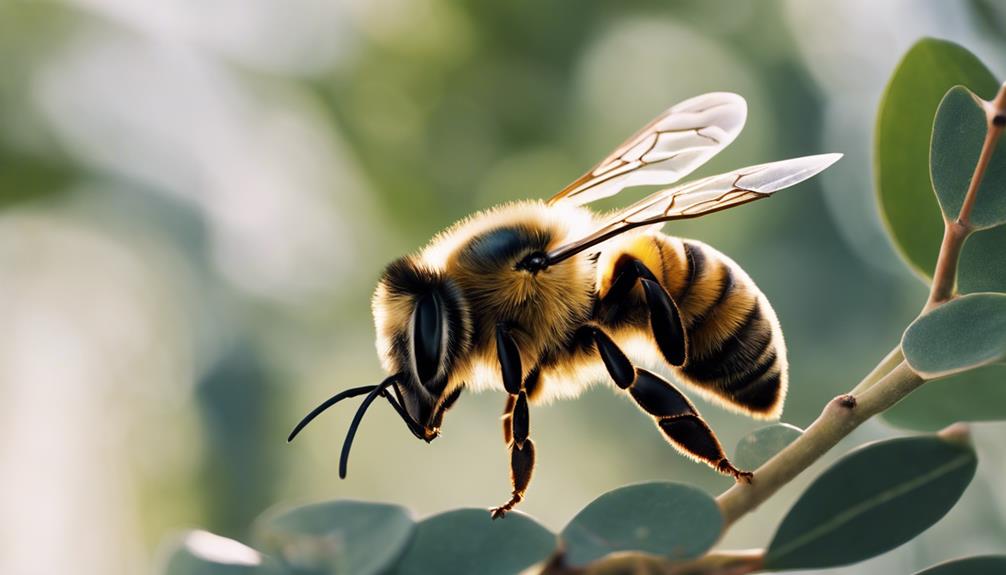
Eucalyptus, with its potent aroma, is a natural bee repellent disliked by these pollinators. The strong scent of eucalyptus is like a force field that deters bees from nesting or foraging in areas where it’s present. It’s like a ‘no bees allowed’ sign, thanks to its powerful fragrance that disrupts the bees’ navigation and communication.
Imagine bees taking a whiff of eucalyptus and buzzing off in the opposite direction! Whether it’s eucalyptus plants or oil, these can be strategic tools to keep bees away from spots you want to bee-free.
Lemongrass
We’ve discovered that lemongrass emits a scent that strongly repels bees and keeps them at bay. Lemongrass’s natural repellent properties make it a great addition to any garden to deter bees.
Here are three ways lemongrass can help you bee-free:
- Plant Lemongrass: Incorporate lemongrass in your garden or yard to create a barrier that bees won’t cross.
- Use Essential Oil: Lemongrass essential oil can be utilized in DIY bee repellent sprays or diffusers to keep these buzzing insects away.
- Enjoy the Aroma: The pleasant lemony aroma of lemongrass not only repels bees but also adds a refreshing scent to your surroundings.
With lemongrass, you can enjoy a bee-free garden while basking in its delightful fragrance!

Hello! My name is Noel Calvin. I graduated from UCLA and now work as a writer at Launch Ninjas. I write blog posts that inspire and guide our readers in their entrepreneurial pursuits. I live in Pleasantville, NJ, with a peaceful yet lively atmosphere that inspires me.
Writing stories is more than just a job for me. It allows me to share my observations and satisfy my curiosity about the world. I combine my analytical skills with creative enthusiasm to delve into technology trends and startup stories. But my life isn’t limited to screens and keyboards. I value loyalty, passion, and a touch of old-fashioned charm, which I infuse into every narrative I create.
I love spending time in my garage, jamming with my band when I’m not writing. Playing the guitar and singing bring me immense joy. I also enjoy capturing ordinary and extraordinary moments through my camera lens and exploring new culinary adventures that excite my taste buds. I’m always seeking new experiences.
My family is very important to me. Joyful Sunday brunches filled with laughter and intense board game nights keep me grounded, reminding me of life’s simple pleasures.
In my world, every moment is an opportunity for discovery. Every discovery is a story worth sharing, whether a heartfelt moment at home or the pulse of technological innovations. Join me as I navigate through life, one blog post, one guitar strum, and one heartwarming family dinner at a time.
